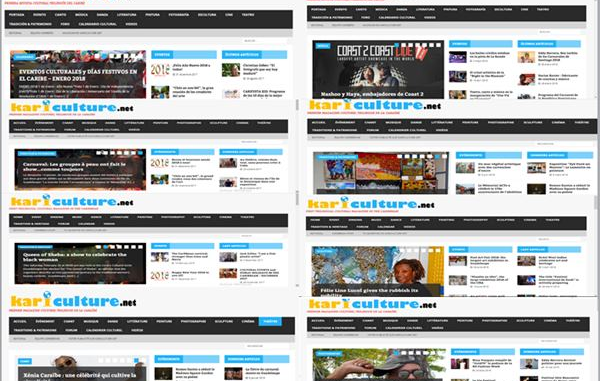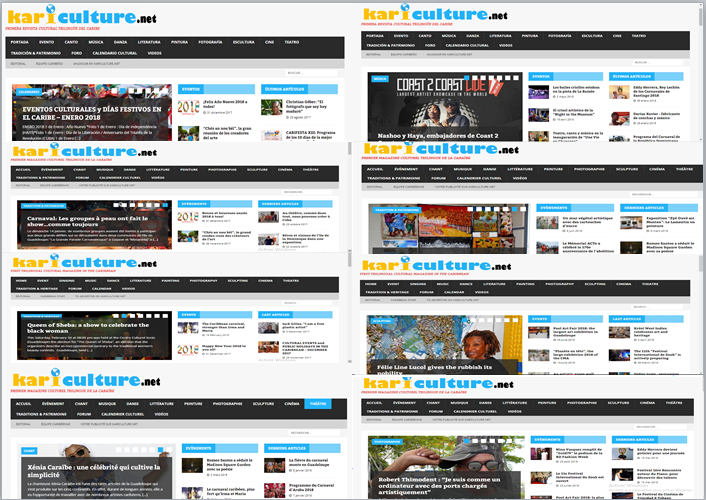
On September 14, 2016, the magazine Kariculture.net was launched in the Guadeloupean and Caribbean media landscape. Its launch was not easy but the challenge was taken up in spite of everything. Kariculture.net is, for the moment, the only trilingual webmagazine (French, English and Spanish) that wishes to present the Caribbean arts and cultural news in a professional way thanks to the collaboration of Caribbean journalists. We have already published more than 1,000 articles in all three languages and, despite our difficulties, Kariculture.net is an online cultural magazine recognized by the French Ministry of Culture through the Commission Paritaire des Publications & Agences de Presse /Joint Commission of Publications & Press Agencies (CPPAP) – Law n° 86-897 of August 1st, 1986.
Today, we are waiting for the Regional Council of Guadeloupe, which is in charge of the economic development of the territory, to also recognize Kariculture.net and to help it because it’s a media like the others (radio, television, newspapers) and it’s very important for the plurality of the media in this country. In addition, if the Région Guadeloupe and the Comité du Tourisme des Îles de Guadeloupe (CTIG) count on one million tourists in the Guadeloupean archipelago in the years to come, they must also take account of a local digital press to promote our destination.
Kariculture.net being based in Guadeloupe, some details need to be given to our readers who are in the Caribbean but also in Europe, North America and South America, Africa, Asia.
In Guadeloupe, if there are websites that offer calendars of local cultural events and if some radio stations and television channels or our only daily also broadcast their information on the net, there is almost no magazine or daily written by professional journalists (which is a guarantee of the quality of the information offered to Internet users) broadcasting only online their information while this type of press is expected to grow in the world. However, our Internet network is very developed, each Guadeloupean (children and adults) has one or more smartphones, desktop computers or laptops and tablets, in short everybody is connected… The situation in Guadeloupe is very different from that of Haiti, for example, where there are more than fifteen medias on the internet gathered in the Association Haïtienne des Médias en Ligne / Haitian Association of Online Media (AHML)…
So, Kariculture.net is a pioneer in digital press in Guadeloupe and, for these reasons, it deserves to be supported by our decision-makers. That’s why I am fighting.
Our island located in the Caribbean is French, we have French nationality since 1946. France has always “taught” us to look towards it, towards Europe and we have tended to forget our geographical environment but the elders often repeat that, in the past, Guadeloupe, a French colony, had more relations with its Caribbean neighbors. This egocentrism or “navel-gazing” sometimes resurfaces when we hear, for example, a private local radio station in Guadeloupe assert in an advertisement that it is “the first radio in the Caribbean” and “the first radio in the West Indies” ; it forgets to specify “French Caribbean” and “French West Indies” and there is immediately a very big difference…
Last Thursday, the Regional Council of Guadeloupe has decided to integrate our island into the Organisation of Eastern Caribbean States (OECS). Martinique, also a French territory, has already taken the initiative in 2015. Being part of this regional political organization is a considerable progress, but our peoples are still unknown to other Caribbean peoples. Culture must be a vehicule of communication.
The main objective of this magazine is to present the artistic and cultural heritage of the Caribbean islands. This field is exciting and rich because the artists but also all the inhabitants in this region of the world which is a melting pot of several civilizations show so much creativity and cleverness to create a work or an event. We realize this especially through the “Calendar of cultural events and public holidays in the Caribbean” that we offer each month to our readers. The year-round Caribbean carnival is also an illustration of our ability to create in the cultural field often with limited means we have and even if we have just experienced climatic disasters... Once again, it is not excessive to say that culture is the wealth of the Caribbean.
The Kariculture.net media affirms without any pretension participating in this regional cooperation of which our decision-makers speak in the various political, economic and cultural organizations of the Caribbean (ACS, OECS, CARICOM…). Indeed, our cooperation is first journalistic, then artistic and cultural. This is our modest contribution to the rapprochement of the Caribbean peoples.




